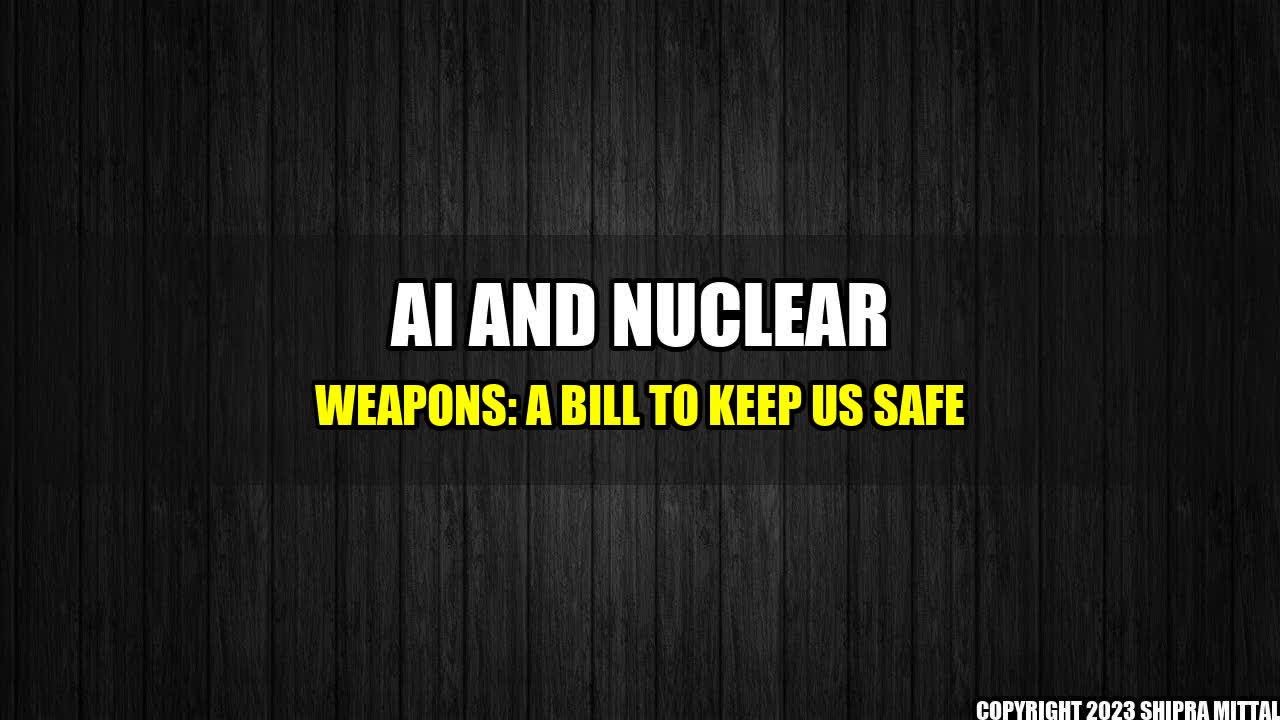A few decades ago, the idea of artificially intelligent machines capable of making decisions on their own sounded straight out of science fiction. Today, AI is everywhere â from virtual assistants to self-driving cars â and it's only getting smarter. But as much as we're excited about the potential benefits of AI, we cannot ignore the risks it poses. One such risk is the use of AI in nuclear weapons. That's why a group of lawmakers in the United States have recently introduced a bill to prevent this from happening.
The Story behind the Bill
The bill in question is titled the "Artificial Intelligence for Nuclear Treaty Monitoring Act", and it aims to prohibit the development or use of AI in nuclear weapons. The bill's authors, Senator Jeff Merkley and Representative Earl Blumenauer, argue that the use of AI in nuclear weapons could lead to catastrophic consequences.
"We simply cannot take the risk that an AI error or mistake â whether caused by intentional hacking or an accident â might lead to nuclear catastrophe," said Merkley.
The bill would require the United States to seek multilateral negotiations on the prohibition of AI in nuclear weapons. It would also support the development and deployment of AI for treaty monitoring and verification, as well as promote transparency and accountability in the use of AI in national security.
Real-Life Examples
The need for such a bill is not unfounded. There have been instances in the past that highlight the potential risks of AI in nuclear warfare.
One such example is the US missile defense system, which relies heavily on AI for early warning and decision-making. In 1983, a computer glitch in the system falsely detected a Russian missile attack, prompting the Soviet Union to prepare for retaliation. It was only thanks to the human decision-making that a nuclear war was avoided.
Another example is the Stuxnet virus, which was a sophisticated cyber attack that targeted Iran's nuclear program in 2010. The malware was designed to target specific machines and manipulate their functioning, causing centrifuges to spin out of control and ultimately damaging the nuclear program. While Stuxnet was not strictly an AI system, it shows how technology can be used to manipulate critical infrastructure.
Companies in the Spotlight
The bill's introduction has put the spotlight on companies that are involved in both AI and defense. One such company is Google, which has been criticized for its involvement in the Pentagon's Project Maven, designed to use AI for analyzing drone footage. Google eventually withdrew from the project following employee protests and criticism.
Another company is Palantir, which provides AI technologies for national security applications. Palantir has faced criticism for its lack of transparency and accountability, as well as its close ties with US intelligence services.
Conclusion
The introduction of the bill to prohibit AI in nuclear weapons is a welcome step towards ensuring global safety and security. While AI has the potential to revolutionize various sectors and improve the quality of life, it must also be developed and used responsibly. The risks of AI in defense and warfare must be carefully considered, and measures must be taken to prevent catastrophic consequences.
In summary, the AI for Nuclear Treaty Monitoring Act seeks to:
- Prohibit the development or use of AI in nuclear weapons
- Promote transparency and accountability in the use of AI in national security
- Support the development and deployment of AI for treaty monitoring and verification
References and Further Reading
- Lawmakers Introduce Bill to Keep AI from Going Nuclear - Nextgov
- The Legal Battle Over Palantir and the Pentagonâs Data Analysis - MIT Technology Review
- Google urges Pentagon to tread carefully as it explores AI for drone footage analysis - The Guardian
Hashtags
- #AI
- #nuclearweapons
- #lawmakers
- #bill
- #defense
- #realifeexamples
- #criticalanalysis
- #AkashMittal
- #researcharticle

Akash Mittal Tech Article
Share on Twitter Share on LinkedIn